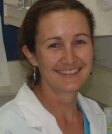Post-Doctoral Fellows
In addition to associated investigators, the Centre supports, and is associated with, a number of post-doctoral fellows working with investigators.
-
Dr Elise Donovan

LiFePATH Group, Liggins Institute, , Auckland
BSc, MS, PhD
Elise completed her BS in exercise science and biology at the University of Toledo, her MS in molecular biology at Long Island University and her PhD in human bioenergetics at Colorado State University (2011). Her interests include applications of evolution to medicine and human health, using humans as well as comparative and in vitro models.
Elise is currently examining how maternal diet and environment around the time of conception and during development may programme individuals for obesity and chronic disease susceptibility as adults. She is also interested in epigenetic mechanisms by which programming occurs, and evolutionary questions surrounding epigenetics and gene mutation.
Supervisor:
Associate Professor Frank Bloomfield; LiFePATH Group, Liggins Institute, , Auckland
-
Dr Clint Gray

Developmental Programming Research Group, Liggins Institute, , Auckland
PhD
Clint completed his PhD in 2011 with the School of Veterinary Science and Medicine at the University of Nottingham, UK. His research investigated the effects of maternal dietary intake of fructose and salt on maternal, fetal and adult offspring development, metabolic status, cardiovascular health and the developmental origins of hypertension. After completing his PhD, Clint was appointed research fellow at the Liggins Institute, .
As part of the Developmental Programming Research Group, Clint is currently researching the effects of maternal diet on offspring’s later-life cardiovascular health and vascular function and novel intervention strategies. Clint’s work involves investigating the role of pre-weaning growth hormone treatment in reversing programmed hypertension in offspring of undernourished mothers. More recently, Clint will be investigating the effects of a maternal diet high in salt and fat upon adult offspring metabolic status, heart, vascular development and subsequent cardiovascular health.
Supervisor:
Associate Professor Mark Vickers; Developmental Programming Group, Liggins Institute, , Auckland
-
Dr Pritika Narayan

Centre for Brain Research, , Auckland
PhD
Pritika completed her PhD in late 2011 at the Centre for Brain Research, University of Auckland with supervisor Prof. Mike Dragunow and co-supervisors Allan Sheppard and Prof. Richard Faull. Her project investigated epigenetic changes in the human brain, with particular interest in Alzheimer’s and Huntington’s disease, with imaging techniques that were developed throughout her study.
Pritika has continued her research in epigenetics (how the environment can influence our genes), in particular how pharmaceuticals regulate epigenetic processes and is also studying how drugs of abuse (e.g. methamphetamine) alter epigenetic processes in the brain and cause brain damage. She continues to investigate these changes in the human brain, now as a post-doctoral Research Fellow with Prof. Mike Dragunow and colleagues.
Pritika is also now working with Professor Mike Dragunow on the High Content Screening Platform for Cells and Tissues project.
Supervisor:
Professor Mike Dragunow; Centre for Brain Research, Faculty of Medical and Health Science, , Auckland
Current projects:
-
Dr Karina O’Connor

Centre for Free Radical Research, University of Otago, Christchurch
PhD
Karina completed her PhD in 2010 with the Centre for Free Radical Research at the University of Otago, Christchurch. Her research investigated the effects of oxidative stress on DNA methylation. Following an 18-month travel break, Karina has returned to Christchurch to work with Assoc. Prof. Mark Hampton investigating the adaptive responses of cells to oxidative stress. Of particular interest is the hypothesis that mitochondria act as metabolic sensors that communicate with the nucleus through redox-dependent signalling pathways.
Karina's current work involves establishing a cell culture model to investigate the consequences of sub-lethal mitochondrial oxidative stress, and the role of the antioxidant protein Prx 3 in regulating mitochondrial signalling.
Supervisor:
Associate Professor Mark Hampton; Free Radical Research Group, University of Otago, Christchurch
-
Dr Amy Osborne

Amy attended Kings College London as an undergraduate and completed a BSc (Hons) in Biomedical Science (Genetics) before working as a research officer at Imperial College London in the UK, The Wakefield Gastroenterology Research Group in Wellington and the University of Canterbury in Christchurch. She then undertook her PhD at Otago, and a postdoctoral fellowship at the University of Colorado Denver, in developmental genetics.
Amy is now work to understand predictive adaptive responses (PARs), a particular type of developmental plasticity where the same genotype can produce different phenotypes in response to environmental stimuli; specifically, whether fetal prediction of its future nutritional environment, in response to maternal environmental cues, can affect the future fitness outcomes of the offspring. Fitness is manipulated by altering the dietary composition of Drosophila melanogaster food. This invokes phenotypic changes, which enables the dissection of the genetic mechanisms underlying PARs. Amy hopes to discover if PARs are transgenerational – whether, once invoked, they are sustained through generations regardless of the external environment to which the offspring are exposed. This work helps to: understand the innate nature of PARs; uncover which genetic mechanisms are involved in sustaining a transgenerational response; in a wider sense, will contribute to the debate surrounding the current epidemic of non-communicable disease.
Supervisor:
Associate Professor Peter Dearden; Laboratory for Evolution and Development, Department of Biochemistry, University of Otago, Dunedin
-
Dr Clare Reynolds

Developmental Programming Group, Liggins Institute, , Auckland
Clare completed her PhD in 2008 with the Nutrigenomics Research Group at University College Dublin. She followed on from this with a post-doctoral position with Prof. Helen Roche investigating the contribution of inflammation and dietary lipids on adipose tissue dysfunction.
In 2012 Clare was appointed research fellow in the Developmental Programming Research Group at Liggins and will investigate maternal programming-induced metabolic inflammation. Clare’s current project investigates the role of pre-weaning growth hormone treatment in reversing adipose tissue insulin resistance and inflammation in adult offspring following maternal undernutrition.
Supervisor:
Associate Professor Mark Vickers;Developmental Programming Research Group, Liggins Institute, University of Auckland, Auckland
-
Dr Jo Stanley

PhD
Supervisor:
Professor Phil Baker; Liggins Institute, , Auckland
-
Dr Karolina Sulek

PhD
Karolina completed her PhD at the Technical University of Denmark with supervisor Prof. Tine Rask Licht and co-supervisors Dr Thomas Hjort Skov and Dr Joern Smedsgaard. She did research in metabolomics connected to the gut bacteria, prebiotics and probiotics, investigating their effect on the mammalian host. She performed in vitro studies with clean and mixed bacterial cultures, and in vivo with the germ-free mice. Metabolites were analyzed with MS techniques. Differences between given set of samples were investigated by statistical tools, such as unsupervised Principal Component Analysis (PCA) and supervised Partial Least Square Discriminant Analysis (PLS-DA). She visited as an exchange student, performing metabolites extractions from plasma and various types of animal tissues.
Karolina continues her work in metabolomics with Prof. Philip Baker and Dr Silas Villas-Boas, aiming to develop screening tests for major pregnancy complications of preeclampsia, preterm birth and fetal growth restriction. These are responsible for massive maternal and fetal complications, and surviving babies are at increased risk of serious diseases in adulthood: such as heart disease, hypertension and diabetes. In addition, we are interested in developing methods to study environmental exposures in pregnancy, and to study whether the effects of treatments in pregnancy lead to changes in the metabolomic profile which suggest likely efficacy. The position of post-doctoral fellow involves development of mass spectrometry methods for metabolite profiling of biological fluids: serum, plasma and urine.
Supervisor:
Professor Phil Baker; Liggins Institute, , Auckland
-
Board
Ensures the direction and performance of Gravida in the context of the Annual Plan ...
-
Executive Team
Manages the operational and strategic aspects of Gravida ...
-
Scientific Advisory Board
Provides independent advice on the relevance and impact of the Centre's research ...
-
International College
Gravida has an ‘International College’ of global experts who provide leadership to ...
-
Administrative Staff
-
Principal Investigators
Funded or associated with Gravida through a number of major and pilot projects ...
-
Associate Investigators
Funded or associated with Gravida through a number of major and pilot projects ...
-
Project Staff
Supported by a number of technicians and other non-investigators ...
-
Students